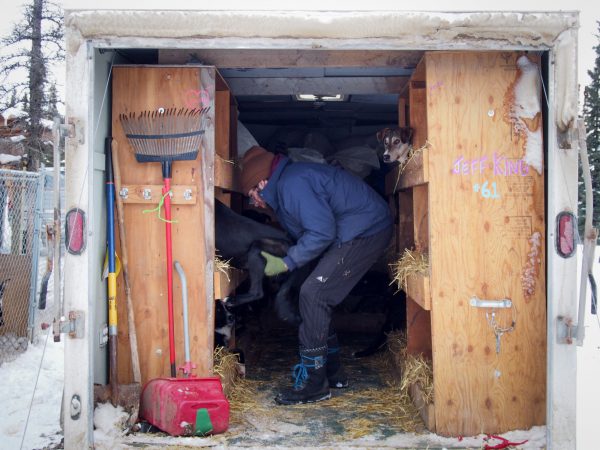
Behind many of the world’s top mushing champions is an army of cheap, semi-skilled labor: dog handlers.
Across Alaska, handlers play a pivotal role in competitive mushing. They manage sprawling kennels and help train sled-dogs for competition. It’s a system that thrives on an unconventional economic arrangement.
In a chilly, dim room, Tara Cicatello stirred a bucket of frothy brown liquid, a mix of kibble and frozen meat that’s been thawed into a soupy gruel.
“I am making dog food!” Cicatello said cheerfully.
Cicatello grabbed a heavy bucket in each hand, carefully trundled out to the dog yard, and began slopping food into bowls, greeting and cooing to each dog. She is in charge of feeding 25 sled-dogs two to three times a day. After they eat, she retraces her steps, scooping away piles of poop.
“I just take the sled in one hand, shovel in the other, and I just knock it out,” Cicatello laughed in between scoops.
The whole routine takes about an hour. Most of the time it’s in the dark, under a headlamp. And there are no days off, even when it’s -50 degrees, as it was just a week earlier.
This is the less glamorous side of dog mushing.
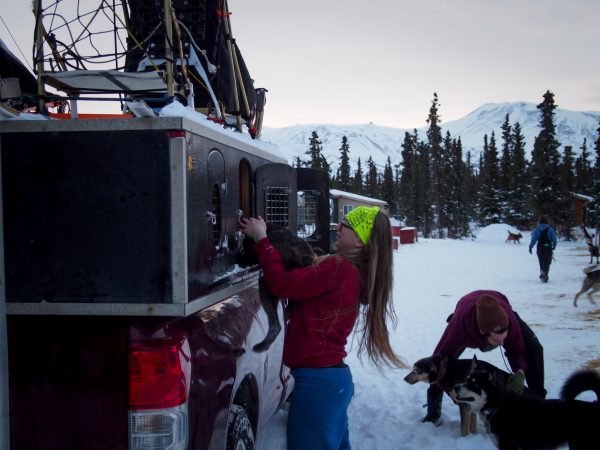
Cicatello is a handler for a relatively new musher, Kristin Bacon, who finished her first Iditarod last year. This season, Bacon is training out of champion musher Jeff King’s Husky Homestead by Denali Park. Cicatello stays in a cozy apartment on the property and gets a modest monthly stipend. In exchange, she does everything from feedings to practice runs to mushing the dogs in mid-distance races. One of which, the Tustamena 200, the two women were getting ready for. The week after, Cicatello would compete in the Willow 300 solo.
Bacon sat on the floor, helping Cicatello plot her rest along the trail.
“Talvista to Deshka Landing is 75 miles,” Bacon cautioned, asking if she really wanted to do the full leg or would rather break it up with “a little nap.”
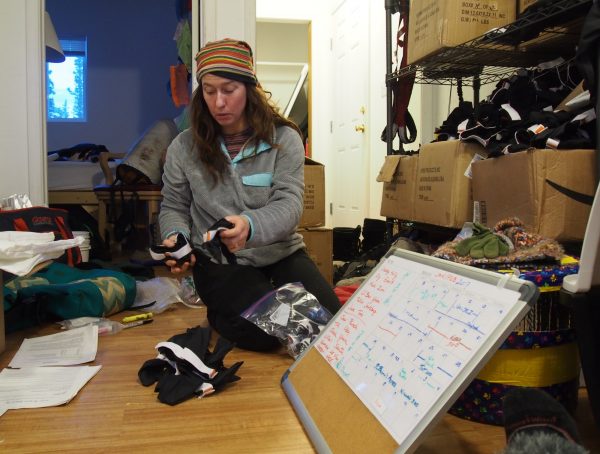
These logistics are extremely complex, like planning a multi-day camping trip spread over 200 miles. But accompanied by a pack of animals attached to each other by ropes.
The two women assemble drop bags with all the supplies they’ll need, from food (some for themselves, most for the dogs) to overstuffed Ziplocks full of dog-booties, color coordinated to match each animal’s paw size.
“Libby red, Yama orange, Skeeter red,” Bacon said, ticking off a list.
This is where good help makes a huge difference. Bacon needs a lot from her handler. Particularly because she herself is not a fully professional musher, and still works a job as a physical therapist for kids to pays her bills. She loves the work, but it requires regularly traveling to small communities far away from her kennel. When she’s gone, Bacon needs Cicatello not just to dog-sit, but also put miles on the team for serious races.
“I…need to pay to have really good help here with my dogs, and trust that whoever’s here taking care of them and feeding them is doing an appropriate job, so that I can go work,” Bacon said.
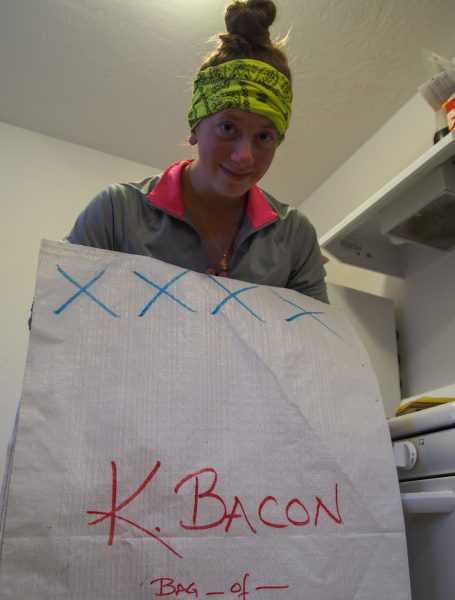
For handlers, though, the economic logic is less orthodox.
The arrangement falls somewhere between an apprenticeship and indentured servitude. Even though it is an unconventional gig, handlers are subject to the same state labor laws and minimum wage standards as any other workers counted as employees in Alaska. Deborah Kelly, director of Standards and Safety for the Department of Labor, said she recalled hardly any claims reported to the state in the last decade about labor abuse from the “mushing industry.” Compared to restaurants and massage parlors, which frequently generate complaints from employees, dog handling was described as unremarkable.
But there’s no doubt the working conditions are challenging. For Cicatello, the grit is a selling point.
“I love adventure, and I love going out and doing things,” Cicatello said. “Sitting in an office was not fulfilling.”
Cicatello graduated a few years ago with an English degree from a college in upstate New York, where she grew up. She got her start mushing when she lived in Nome (we had the same employer, were briefly roommates, and have since stayed in touch). Handling dogs is a bit of a career gamble for her if she ever decides to leave the mushing world.
“I wish I could tell you I had long term life plans, but I’m really bad at making those. So far I’ve been living my life season to season,” Cicatello explained.
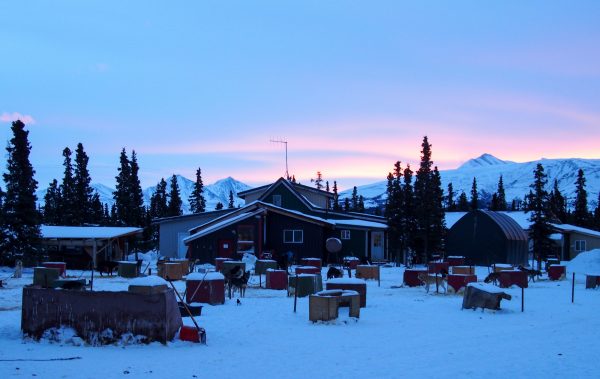
In some ways, mushing is highly specialized labor. But Cicatello doesn’t feel like she’s cutting herself off from other work opportunities. She’s just 25 years old, and has had enough odd and seasonal jobs that she isn’t worried about finding other work if the need arises.
And you don’t get into mushing to make money. That’s a sentiment expressed by other handlers and mushers alike, including Sean Underwood. He moved up from Georgia to commercial fish, and stuck around Alaska when he got the chance to handle for Jeff King.
“I graduated with a degree in economics, minored in Spanish, and now I’m just running a 12 dog team 200 miles on the Kenai Peninsula,” Underwood said with a wide smile, preparing a sled for the same race as Cicatello.
“I don’t know where the supply-and-demand chart for economics comes into play there,” he added.
This is Underwood’s first sled-dog race, and he looked both nervous and surprised. He never expected to be in this position. Back in Atlanta, he was a hotel valet and substitute Spanish teacher. So far, he prefers handling. Even though financially he’s only just breaking even, he believes this as a deposit toward his future.
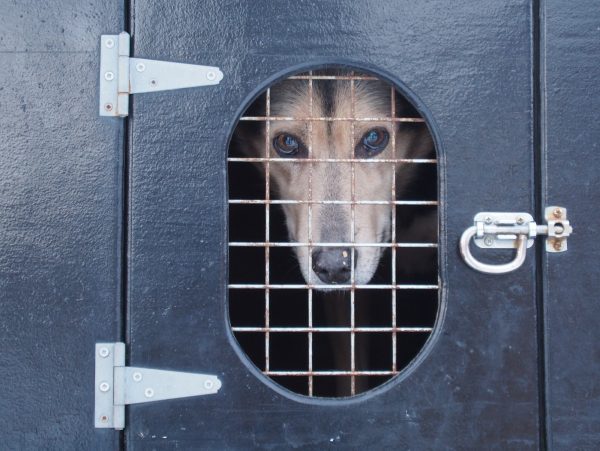
“If I’m not saving for retirement at 25 right now I’m not super worried about it,” he explained. “For now, it’s been one hundred percent about investing in an experience, and doing something that I’ll be talking about, and thinking about, and drawing from for the rest of my life.”
In this calculus, adventure is the profit.
A few weeks later, Cicatello followed up about the Tustamena 200 race. She took 17th place, three spots behind Underwood. But she was quick to offer a defense.
“He was running Jeff’s A-team,” Cicatello said.
Even still, Cicatello now has enough race miles to be qualified for next year’s Iditarod. If she sticks around.
Zachariah Hughes reports on city & state politics, arts & culture, drugs, and military affairs in Anchorage and South Central Alaska.
@ZachHughesAK About Zachariah




